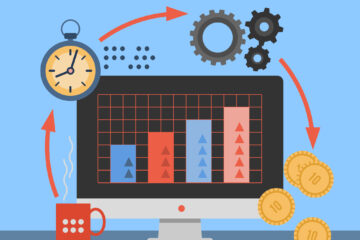Project Planning and Time Management for Maximum Efficiency
Can businesses achieve maximum efficiency without a strategic approach to managing their projects? The answer lies in understanding the importance of effective time management in driving productivity and business growth.
Efficient project planning and time management are crucial for businesses to stay competitive. By adopting a strategic approach, organizations can optimize their resources, streamline processes, and enhance overall productivity.
Key Takeaways
- Effective time management is vital for maximum efficiency.
- A strategic approach to project planning drives business growth.
- Productivity is enhanced through optimized resource allocation.
- Streamlined processes contribute to overall efficiency.
- Businesses must adopt a proactive approach to stay competitive.
The Fundamentals of Strategic Project Planning
Strategic project planning is the backbone of any successful project management initiative. It involves a comprehensive approach to managing projects, ensuring they are completed on time, within budget, and to the required quality standards.
Project managers have a lot on their plates, juggling multiple tasks, deadlines, and meetings. Effective time management techniques are crucial in this context, enabling project managers to prioritize tasks, allocate resources efficiently, and mitigate potential risks.
The fundamentals of strategic project planning include setting clear objectives, defining project scope, and establishing a realistic timeline. It also involves identifying and allocating necessary resources, as well as developing a contingency plan to address potential issues.
By adopting a strategic approach to project planning, organizations can enhance their ability to deliver successful projects. This, in turn, can lead to improved customer satisfaction, increased competitiveness, and better return on investment.
In essence, strategic project planning is about creating a roadmap for project success. It requires a deep understanding of project management principles, as well as the ability to adapt to changing circumstances.
Essential Project Planning and Time Management Principles
Mastering essential project planning and time management principles is vital for delivering projects on time and within budget. Effective time management techniques enable individuals to be more productive, have more energy for tasks, feel less stressed, and enjoy more free time.
The benefits of effective project planning include enhanced productivity, reduced stress, and improved work-life balance. By applying these principles, individuals can better manage their workload, prioritize tasks, and achieve their goals.
Some key project planning principles include setting clear objectives, breaking down complex tasks into manageable steps, and establishing realistic timelines. Time management principles, on the other hand, involve prioritizing tasks, avoiding distractions, and minimizing procrastination.
- Setting clear objectives and goals
- Prioritizing tasks based on importance and urgency
- Using productivity techniques such as the Pomodoro Technique
By integrating these principles into daily practice, individuals can significantly improve their project planning and time management skills, leading to greater success in their personal and professional lives.
Strategic Time Management Techniques for Project Success
The implementation of strategic time management techniques is a key factor in driving project success. Effective time management enables project teams to prioritize tasks, manage resources efficiently, and meet deadlines.
There are several time management techniques that project managers can utilize to enhance productivity. Two widely recognized methods are the Eisenhower Matrix and the ABC Method.
The Eisenhower Matrix is a decision-making tool that helps individuals prioritize tasks based on their urgency and importance. By categorizing tasks into four quadrants – urgent & important, important but not urgent, urgent but not important, and not urgent or important – project teams can focus on the most critical tasks first.
The ABC Method involves labeling tasks with letters A, B, or C based on their priority. ‘A’ tasks are high priority, ‘B’ tasks are medium priority, and ‘C’ tasks are low priority. This method allows teams to tackle high-priority tasks before moving on to less critical ones.
- Prioritizing tasks based on their urgency and importance
- Focusing on high-priority tasks first
- Minimizing distractions and interruptions
- Utilizing technology to automate repetitive tasks
- Setting realistic deadlines and milestones
By adopting these strategic time management techniques, project teams can enhance their productivity, manage resources more effectively, and ultimately drive project success.
Project Scheduling and Deadline Management
The success of a project heavily relies on its scheduling and deadline management. Effective project scheduling ensures that all tasks are completed on time, and resources are allocated efficiently. It involves creating a detailed timeline of the project, including milestones and deadlines.
One of the key tools for deadline management is the use of planners and calendars. These tools help in visualizing the project timeline, scheduling tasks, and preventing time conflicts. By having a clear overview of the project schedule, project managers can identify potential bottlenecks and make necessary adjustments.
Here are some benefits of using planners and calendars for project scheduling:
- Enhanced visualization of the project timeline
- Improved task scheduling and allocation
- Better management of deadlines and milestones
- Reduced risk of time conflicts and delays
Time management tools such as digital calendars and project management software play a crucial role in modern project scheduling. They offer features like automated reminders, task assignments, and real-time progress tracking, making it easier to manage complex projects.
Incorporating time management tools into project scheduling can significantly enhance the efficiency of the project planning process. By leveraging these tools, project managers can ensure that their projects are completed on time, within budget, and to the required quality standards.
Effective project scheduling and deadline management are critical components of successful project delivery. By utilizing the right tools and techniques, project managers can overcome the challenges of managing complex projects and achieve their goals.
Essential Tools and Software for Project Planning and Time Tracking
The right project management tools can help teams stay organized, focused, and on track to meet their project deadlines. In today’s digital age, numerous project management software options are available, each offering unique features and benefits.
Key Features of Effective Project Management Software
- Task management and assignment
- Time tracking and reporting
- Collaboration and communication tools
- Gantt charts and project scheduling
- Integration with other business applications
One popular project management tool is Jira, which integrates seamlessly with the Eisenhower Matrix approach. Jira’s features, such as issue tracking, timelines, and backlogs, are specifically designed for project managers. The backlog serves as a repository for all project tasks, allowing teams to capture and categorize tasks efficiently.
Different businesses have unique needs, and the choice of project management software depends on these specific requirements. Some top project management solutions include:
- Jira: Ideal for software development teams and complex projects
- Trello: Suitable for teams that prefer a Kanban board approach
- Asana: Effective for task management and team collaboration
- Microsoft Project: Comprehensive project management for large-scale projects
When selecting a project management tool, it’s essential to consider factors such as scalability, user interface, and customer support. By choosing the right tool, teams can enhance their productivity, streamline their workflows, and achieve their project goals.
Tracking and Measuring Project Progress
Measuring project progress is fundamental to achieving project goals and delivering results. Effective time management empowers project managers to navigate the complexities of single and multiple projects with focus, efficiency, and a sense of control.
Key Metrics for Project Progress Tracking
- Task completion rates
- Project timeline adherence
- Resource utilization
- Budget variance
To effectively track project progress, teams should establish clear metrics and benchmarks. This involves setting realistic goals, identifying critical milestones, and utilizing time management metrics to monitor progress.
Some essential tools for tracking project progress include project management software, time tracking applications, and productivity measurement tools. These tools enable teams to stay on track, identify potential roadblocks, and make data-driven decisions.
By implementing a robust project progress tracking system, teams can improve their overall productivity measurement and achieve better project outcomes. This involves regularly reviewing project status, adjusting strategies as needed, and maintaining open communication among team members.
Implementing Effective Project Planning and Time Management Systems
Robust project planning and time management systems are the backbone of any successful project, enabling teams to achieve their objectives efficiently. To implement such systems, it’s crucial to start with a thorough understanding of the project’s scope and requirements.
Estimating activity duration is a critical step in this process. It involves predicting the amount of time required to complete each task, which helps in setting realistic expectations and creating a feasible project timeline. Accurate estimation is vital to prevent delays and ensure that the project stays on track.
To create a project timeline, one must consider the dependencies between tasks, the availability of resources, and potential roadblocks. Utilizing project management tools can significantly simplify this process by providing a clear visual representation of the project’s progression and helping teams stay organized.
Monitoring progress is another essential aspect of effective project planning and time management. It involves tracking the actual time spent on tasks against the estimated time and making adjustments as necessary. This helps in identifying areas where the project may be falling behind and allows for timely interventions.
Some key strategies for implementing effective project planning and time management systems include:
- Defining clear project objectives and scope
- Breaking down the project into manageable tasks
- Establishing realistic timelines and milestones
- Utilizing project management software to track progress and collaborate with team members
By adopting these strategies and maintaining a focus on productivity strategies and time management systems, teams can enhance their ability to deliver projects on time and within budget.
Cultural Considerations in Project Time Management
As projects become increasingly global, the impact of cultural nuances on time management cannot be overstated. In today’s interconnected world, project managers must navigate diverse cultural landscapes to ensure successful project outcomes.
Cultural attitudes towards time and punctuality vary significantly across different cultures. For instance, some cultures view punctuality as a sign of respect and professionalism, while others may have a more flexible approach to time. Understanding these cultural differences is crucial for effective global project management.
Here are some key cultural considerations that project managers should be aware of:
- Differences in time perception and punctuality
- Variations in communication styles and preferences
- Different attitudes towards deadlines and flexibility
- Cultural influences on work ethic and motivation
To manage projects effectively across cultures, project managers can adopt several strategies. These include:
- Developing cultural intelligence to better understand team dynamics
- Adapting project management styles to accommodate cultural differences
- Fostering open communication to clarify expectations and deadlines
- Being flexible and adaptable in response to cultural nuances
By acknowledging and respecting cultural differences, project managers can enhance collaboration, improve team performance, and drive project success in a global context. Effective project time management in multicultural environments requires a nuanced understanding of these cultural considerations.
Conclusion
Effective project planning and time management are crucial for achieving maximum efficiency and productivity. By implementing strategic planning, utilizing time management techniques, and leveraging essential tools and software, individuals can significantly enhance their productivity.
The importance of time management in project planning cannot be overstated, as it directly impacts the success of projects and overall job satisfaction. Evaluating the effectiveness of time management strategies is essential to identify areas for improvement and make adjustments accordingly.
Successful time management leads to greater personal happiness, more accomplishments at home and at work, and a more satisfying future. By adopting the principles and techniques outlined in this article, individuals can optimize their productivity and achieve their goals, ultimately leading to a more fulfilling life and career.
In summary, the significance of time management in project planning is vital, and its impact is felt across various aspects of life, underscoring the importance of effective time management in achieving success, or أهمية إدارة الوقت في تخطيط المشاريع.
FAQ
What is the importance of project planning in achieving maximum efficiency?
Project planning is crucial in achieving maximum efficiency as it enables teams to prioritize tasks, allocate resources effectively, and manage time efficiently, ultimately leading to successful project outcomes.
How does effective time management contribute to project success?
Effective time management is essential for project success as it enables teams to prioritize tasks, manage deadlines, and allocate resources efficiently, resulting in increased productivity and reduced stress.
What are some strategic time management techniques that can be applied in project management?
Techniques such as the Eisenhower Matrix and the ABC Method can be used to prioritize tasks, manage time effectively, and increase productivity in project management.
How can project scheduling and deadline management be effectively implemented?
Project scheduling and deadline management can be effectively implemented by using planners and calendars to schedule tasks, setting realistic deadlines, and regularly monitoring progress.
What are some essential tools and software used for project planning and time tracking?
Tools such as Jira and other project management software are used for project planning and time tracking, enabling teams to manage tasks, track progress, and collaborate effectively.
How can project progress be effectively tracked and measured?
Project progress can be effectively tracked and measured by monitoring productivity and time management metrics, enabling teams to identify areas for improvement and make data-driven decisions.
What are some cultural considerations that need to be taken into account in project time management?
Cultural differences in approaches to time and punctuality need to be considered in global project management, requiring teams to be aware of and adapt to different cultural norms and expectations.
How can effective project planning and time management systems be implemented?
Effective project planning and time management systems can be implemented by estimating activity duration, creating project timelines, and monitoring progress to ensure successful project outcomes.
What are the benefits of using project management software for time tracking?
Project management software enables teams to track time spent on tasks, manage deadlines, and collaborate effectively, resulting in increased productivity and reduced stress.
How can teams prioritize tasks effectively in project management?
Teams can prioritize tasks effectively by using techniques such as the Eisenhower Matrix and the ABC Method, enabling them to manage time efficiently and focus on high-priority tasks.








